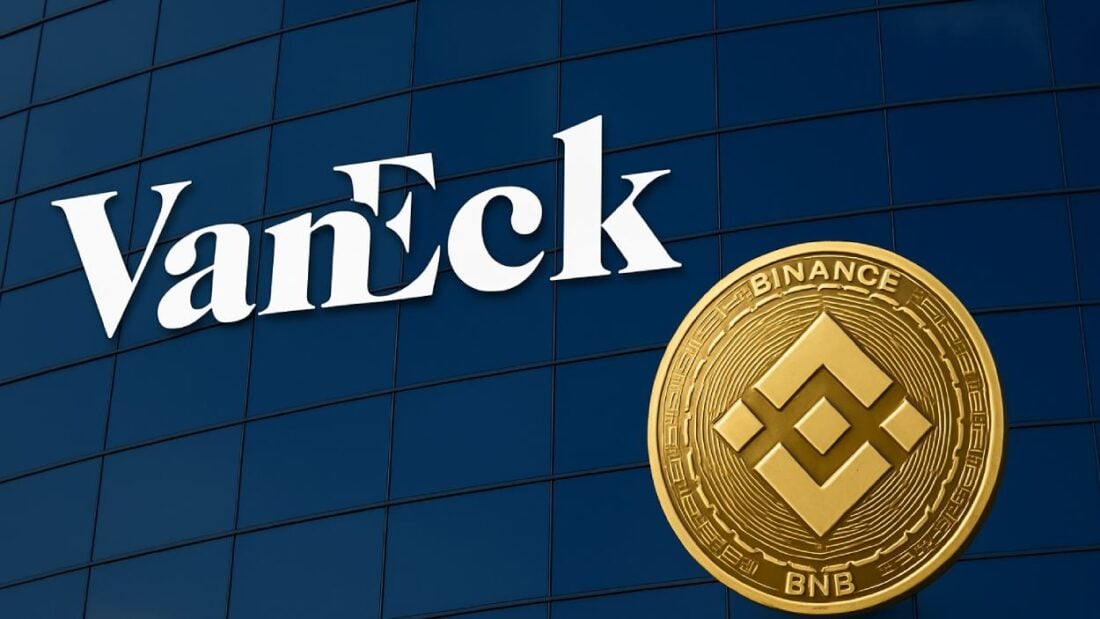VanEck has officially filed with the SEC to launch the first U.S.-listed spot BNB ETF, but its latest amendment walks back earlier plans to offer staking rewards.
Key Takeaways
- VanEck submitted an updated S-1 filing to the SEC to list a spot BNB ETF under the ticker symbol VBNB on Nasdaq.
- The fund will hold actual BNB tokens in custody, avoiding futures or synthetic exposure.
- Staking rewards, initially hinted at, were removed from the final filing amid regulatory uncertainty.
- VanEck acknowledges the risk of BNB being classified as a security, which could impact the ETF’s future.
What Happened?
VanEck, a well-known asset manager in the crypto ETF space, filed an amended registration with the U.S. Securities and Exchange Commission (SEC) to launch a spot BNB ETF. Initially suggesting the possibility of staking rewards for investors, the company has since retracted that feature in its latest filing. This filing marks a notable attempt to bring the fifth-largest cryptocurrency by market cap into the regulated investment arena.
UPDATE: VanEck has officially filed for a spot $BNB ETF
— ZYN (@Zynweb3) November 25, 2025
Ain’t stopping
The firm submitted an application for VBNB, a spot BNB exchange-traded fund that would list on Nasdaq and hold BNB directly, just like the Bitcoin and Ethereum spot ETFs.
This is a big signal for the… pic.twitter.com/nSvxDTVKlr
VanEck’s ETF Proposal for BNB
VanEck’s ETF, proposed under the ticker VBNB, would give investors exposure to the real-time price of BNB, the native token of the BNB Chain. Unlike products based on futures contracts, VBNB will be physically backed by BNB tokens held in custody, giving it the structure similar to already-approved Bitcoin and Ethereum spot ETFs.
Key features include:
- Direct exposure to BNB without using derivatives or futures.
- Listing on Nasdaq, pending SEC approval.
- No staking rewards at launch despite previous suggestions.
VanEck initially included a provision in a previous filing that ETF investors might benefit from staking rewards. However, in its latest update, the firm stated unequivocally that the trust “will not employ its BNB in Staking Activities and accordingly will not earn any form of staking rewards or income of any kind.”
This decision sets VBNB apart from VanEck’s recent Solana ETF, which includes staking yields, and reflects a more cautious approach in light of BNB’s regulatory status.
Regulatory Complications and Caution
VanEck’s updated filing did not offer a detailed explanation for pulling back on staking, but it strongly hints at concerns over regulatory classification. The firm noted that BNB may currently be or may later be deemed a security by the SEC or a federal court. If that happens, VanEck could be forced to dissolve the ETF.
The BNB token has faced scrutiny in the past. In 2023, the SEC labeled it among 68 digital assets considered unregistered securities in its lawsuits against Binance, Coinbase, and Kraken. However, a federal court later ruled that secondary BNB sales did not amount to securities transactions, muddying the regulatory waters further.
Why This ETF Could Matter?
Should the SEC approve VBNB, it would be the first regulated U.S. investment vehicle for BNB, which until now has only been accessible through crypto exchanges or overseas ETPs. This move would place BNB alongside Bitcoin, Ethereum, and Solana, which have seen recent ETF approvals.
Industry analysts see this filing as part of a broader trend in 2025, with asset managers expanding beyond Bitcoin and Ethereum into large-cap tokens like BNB and Solana. It also reflects a growing appetite from institutional investors looking for transparent and regulated crypto investment options.
CoinLaw’s Takeaway
In my experience, this filing is a big deal not just for BNB holders but for the entire crypto ETF landscape. VanEck is clearly trying to balance innovation with regulatory caution. By walking back staking, they may lose a bit of investor appeal in the short term, but it’s a smart move if it helps the SEC greenlight the ETF faster. I found it especially interesting that VanEck is being so transparent about the risks that tells me they’re serious about getting this right. If approved, this could open the floodgates for more layer-1 tokens to join the ETF market.


































































